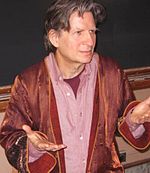Mark Satin, Date of Birth
TweetMark Satin
American political theorist, author, and newsletter publisher
 Date of Birth: 16-Nov-1946
Date of Birth: 16-Nov-1946
Profession: author, journalist, political theorist
Nationality: United States
Zodiac Sign: Scorpio 
About Mark Satin
- Mark Ivor Satin (born November 16, 1946) is an American political theorist, author, and newsletter publisher.
- He is best known for contributing to the development and dissemination of three political perspectives – neopacifism in the 1960s, New Age politics in the 1970s and 1980s, and radical centrism in the 1990s and 2000s.
- Satin's work is sometimes seen as building toward a new political ideology, and then it is often labeled "transformational", "post-liberal", or "post-Marxist".
- One historian calls Satin's writing "post-hip".After emigrating to Canada at the age of 20 to avoid serving in the Vietnam War, Satin co-founded the Toronto Anti-Draft Programme, which helped bring American war resisters to Canada.
- He also wrote the Manual for Draft-Age Immigrants to Canada (1968), which sold nearly 100,000 copies.
- After a period that author Marilyn Ferguson describes as Satin's "anti-ambition experiment", Satin wrote New Age Politics (1978), which identifies an emergent "third force" in North America pursuing such goals as simple living, decentralism, and global responsibility.
- Satin spread his ideas by co-founding an American political organization, the New World Alliance, and by publishing an international political newsletter, New Options.
- He also co-drafted the foundational statement of the U.S.
- Green Party, "Ten Key Values". Following a period of political disillusion, spent mainly in law school and practicing business law, Satin launched a new political newsletter and wrote a book, Radical Middle (2004).
- Both projects criticized political partisanship and sought to promote mutual learning and innovative policy syntheses across social and cultural divides.
- In an interview, Satin contrasts the old radical slogan "Dare to struggle, dare to win" with his radical-middle version, "Dare to synthesize, dare to take it all in".Satin has been described as "colorful" and "intense", and all his initiatives have been controversial.
- Bringing war resisters to Canada was opposed by many in the anti-Vietnam War movement.
- New Age Politics was not welcomed by many on the traditional left or right, and Radical Middle dismayed an even broader segment of the American political community.
- Even Satin's personal life has generated controversy.
Read more at Wikipedia
See Also
- Famous People's Birthdays on 16 November, United States
- Famous People's Birthdays in November, United States
- Famous author's Birthdays on 16 November, United States
- Famous author's Birthdays in November, United States
- Famous journalist's Birthdays on 16 November, United States
- Famous journalist's Birthdays in November, United States
- Famous political theorist's Birthdays on 16 November, United States
- Famous political theorist's Birthdays in November, United States

